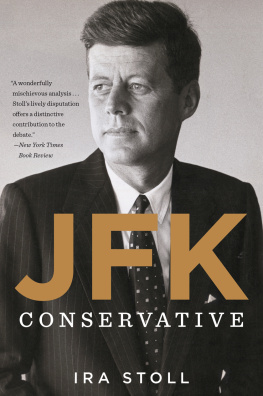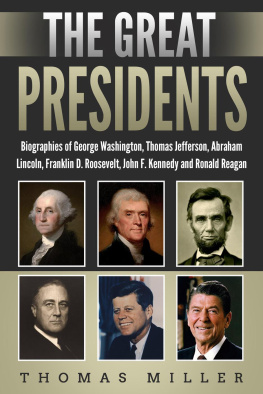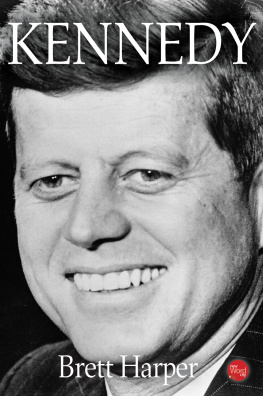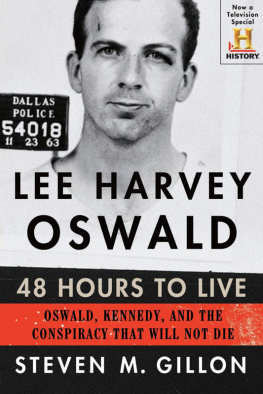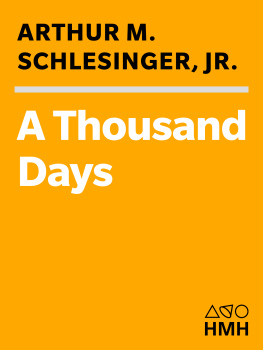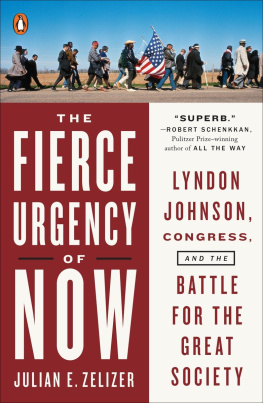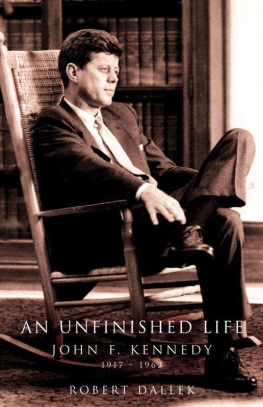First Mariner Books edition 2014
Copyright 2013 by Ira Stoll
All rights reserved
For information about permission to reproduce selections from this book, write to or to Permissions, Houghton Mifflin Harcourt Publishing Company, 3 Park Avenue, 19th Floor, New York, New York 10016.
www.hmhco.com
The Library of Congress has cataloged the print edition as follows:
Stoll, Ira, date.
JFK, conservative / Ira Stoll.
pages cm
Includes bibliographical references and index.
ISBN 978-0-547-58598-7 ISBN 978-0-544-33454-0 (pbk.)
1. Kennedy, John F. (John Fitzgerald), 19171963Political and social views. 2. United StatesPolitics and government19611963. 3. ConservatismUnited StatesHistory20th century. I. Title.
E842.S825 2013
973.922092dc23
2013001595
Cover design by Brian Moore
Cover photograph Underwood & Underwood/Corbis
e ISBN 978-0-547-58600-7
v3.0117
For Aliza
Prelude
Our Deep Religious Sense
1946
Wherever freedom has been in danger, Americans with a deep sense of patriotism have ever been willing to stand at Armageddon and strike a blow for liberty and the Lord.
JOHN F. KENNEDY , 1946
Boston
J ULY 4, 1946, WAS the first peacetime Fourth of July since America had entered World War II four and a half years before, and the city on this morning had an empty, summer feel about it. The holiday fell on a Thursday, so many Bostonians had decided to take Friday off, too, and had left for long weekends in Maine or on Cape Cod. Arthur Fiedler had conducted the big opening-night concert of the Boston Pops on the Esplanade along the Charles River on July 2; some members of the Boston Symphony Orchestra were already in the Berkshires at Tanglewood. The Boston Red Sox were in first place atop the American League, six and a half games ahead of the Yankees, but even the Red Sox were out of town, away from Fenway Park. Later on July 4, Ted Williams, back with the team after nearly four years as a Marine and Navy aviator, would hit his twenty-first and twenty-second home runs of the season, one in each game of a doubleheader against the Philadelphia As.
Among those remaining in the city for the holiday was the mayor, James Michael Curley. At 10 a.m., downtown, in front of City Hall, he hoisted the American flag, and a parade of about five hundred stepped off down School Street. The detachments from the Army, Marines, Navy, Sons of the American Revolution, and Girl Scouts approached the Granary Burying Ground, where Curleys son, Lieutenant George Curley, placed wreaths on the graves of three men who, 170 years earlier, had signed the Declaration of IndependenceRobert Treat Paine, John Hancock, and Samuel Adams. Then the parade marched down Tremont Street to the Old State House, where, at 10:45, a student from the Boston Latin School stood on the balcony in colonial dress and read the Declaration aloud to the crowd gathered below. Finally they arrived at Faneuil Hall, the red-brick building where Samuel Adams and the Boston Town Meeting had gathered long ago to protest the taxes on tea. This days featured speech was to be delivered by a slim, twenty-nine-year-old lieutenant in the Navy Reserve, a veteran of the war in the Pacific named John Fitzgerald Kennedy.
Kennedy began by talking about how religion had shaped Americans and their history, beginning with the original colonists. Our deep religious sense is the first element of the American character which I would discuss this morning, he said. The informing spirit of the American character has always been a deep religious sense. Throughout the years, down to the present, a devotion to fundamental religious principles has characterized American thought and action.
He went on to discuss the Declaration of Independence itself: Our government was founded on the essential religious idea of integrity of the individual. It was this religious sense which inspired the authors of the Declaration of Independence: We hold these truths to be self-evident: that all men are created equal; that they are endowed by their Creator with certain inalienable rights.
Then he moved to the First Amendment of the Constitution: Our earliest legislation was inspired by this deep religious sense: Congress shall make no law prohibiting the free exercise of religion.
He quoted President Washington: Of all of the dispositions and habits which lead to political prosperity, religion and morality are indispensable supports. He quoted President Lincoln: that this nation, under God, shall have a new birth of freedom, and that government of the people, by the people and for the people shall not perish from the earth. And he quoted Franklin Delano Roosevelt, who had died the year before: We shall win this war, and in victory we shall seek not vengeance, but the establishment of an international order in which the spirit of Christ shall rule the hearts of men and nations.
He quoted Alexis de Tocqueville, the French visitor to America more than one hundred years earlier: You may talk of the people and their majesty, but where there is no respect for God can there be much for man? You may talk of the supremacy of the ballot, respect for order, denounce riot, secessionunless religion is the first link, all is vain.
Kennedy spoke of how the United States had triumphed against assaults on its essential religious ideas. The doctrine of slavery which challenged these ideas within our own country was destroyed in the Civil War, he said. In World War II, the philosophy of racism, which threatened to overwhelm them by attacks from abroad, was also met and destroyed, he said.
Moving on from religion, Kennedy spoke of Americas idealism, and of its individualism:
The American character has been not only religious, idealistic, and patriotic, but because of these it has been essentially individual.
The right of the individual against the State has ever been one of our most cherished political principles.
The American Constitution has set down for all men to see the essentially Christian and American principle that there are certain rights held by every man which no government and no majority, however powerful, can deny.
Conceived in Grecian thought, strengthened by Christian morality, and stamped indelibly into American political philosophy, the right of the individual against the State is the keystone of our Constitution. Each man is free.
He is free in thought.
He is free in expression.
He is free in worship.
While the newspapers were describing this day as the first peacetime Fourth of July, Kennedys speech made clear that Americas ideals and freedoms were again under attack. Today these basic religious ideas are challenged by atheism and materialism: at home in the cynical philosophy of many of our intellectuals, abroad in the doctrine of collectivism, which sets up the twin pillars of atheism and materialism as the official philosophical establishment of the State, he said.
First, Kennedy took aim at the progressive historians at home: In recent years, the existence of this element in the American character has been challenged by those who seek to give an economic interpretation to American history. They seek to destroy our faith in our past so that they may guide our future. These cynics are wrong, for, while there may be some truth in their interpretation, it does remain a fact, and a most important one, that the motivating force of the American people has been their belief that they have always stood at the barricades by the side of God.
America in 1946 was weary of war. More than 400,000 Americans had died in World War II. Those soldiers and sailors who had survived had recently been reunited with wives, parents, or children from whom they had been separated for months or years. Kennedy himself, like many soldiers, had been injured. His back pain may have been one reason the long bony fingers of his hands were gripping the corners of the wooden podium for support as he leaned toward the newspaper reporters gathered in the front row.
Next page
